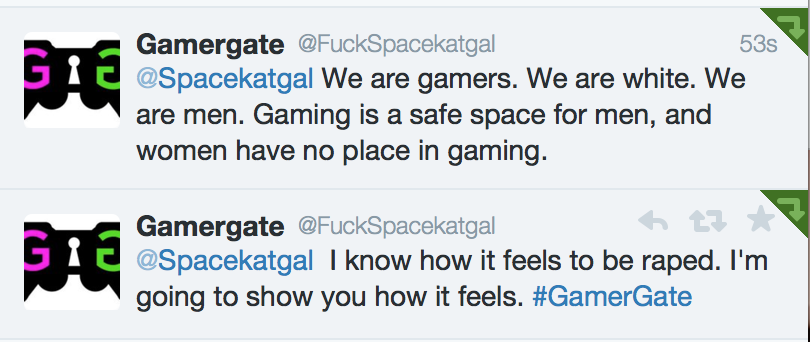Trolls
Laura J. Mixon has written a monumental study of one specific troll who has plagued the SF/F writing community for years, a study remarkable for its depth and thoroughness and titled A Report on Damage Done by One Individual Under Several Names. One writer, chiefly known as “Requires Hate” but frequently blogging under other names, has waged a bitter net war against writers she despises, writers who she thinks are racist, sexist, colonialist, and worse. Her denunciations were violent and bitter, prolonged, and intemperate; she wished people ill, she wished them dead, she followed them to other forums and across Twitter. She wrote to conventions to convince them to disinvite speakers, and wrote to publishers to shame them for publishing racist and sexist work. She reduced many writers to tears and inspired at least one suicide attempt.
Kathryn Cramer touched on this:
Over the past five years, women with established careers in the science fiction field have been treated like they are cheap, plentiful, and easily replaced; disposable as light bulbs. And this treatment has come mostly at the hands of other women.
Interestingly, it is now clear that most of the targets of Requires Hate were young women of color.
This chronicle of intemperate and unrelenting attacks, aimed at driving people out of their chosen field, will remind readers of GamerGate. If you’ve been in New Media for a long time, you’ll also remember trolls who wrecked our early communities: Jorn Barger’s demolition of alt.hypertext (and so much else), and Kali Tal’s destruction of the TechnoCulture list.
It’s not that hard to fix this.
- Anonymous writing should be the exception, not the norm. Write under your own name. Require people writing on your site to write under their own names.
- When people write anonymously, a link to their real name should be held in escrow. That escrow may be secure – I think it can even be secure against law enforcement – but it should not be inconsequential. There should be several competing registrars, as with internet domains.
- Registrars may offer a variety of disclosure policies. One might be, “Your identity will remain as secret as we can make it.” Another might be, “Your identity will remain secret until and unless we have reason to believe that your life, or the life of another person, is in danger and disclosing your identity could be of material benefit.” You might be permitted to nominate a delegate with a limited power to authorize disclosure. (I know of a blogger whose weblog has a locked post, with instructions to the ISP to release that file if they are kidnapped or murdered.)
- I suggest that your first pseudonym have nominal cost, the next costs US$1000, and the next after that costs $10,000. So, even if you have a sock puppet or two, you’ll treat them responsibly.
- Children are entitled to their first pseudonym on their 13th birthday, and can receive a free replacement on turning 18 (or 21). Childrens’ pseudonym’s have the same privacy as adult pseudonyms, but can be identified as belonging to a minor.
But we also need to understand that the bitter steel of righteous wrath must not be deployed casually. People should have denounced Requires Hate ten years ago; it's one thing to be against racism but it's quite another to be unkind, and while some of Requires Hate’s points may have been worth considering, nobody ever thought they were meant kindly.
Just as, while one can sympathize in principle with the threat perceived by #GamerGate, it’s obvious that the expression was contemptible.

Up with this we cannot put. And it’s not just semi-literate redneck ravings. It used to be just fine for Faulkner to write this:
For every Southern boy fourteen years old, not once but whenever he wants it, there is the instant when it’s still not yet two o’clock on that July afternoon in 1863, the brigades are in position behind the rail fence, the guns are laid and ready in the woods and the furled flags are already loosened to break out and Pickett himself with his long oiled ringlets and his hat in one hand probably and his sword in the other looking up the hill waiting for Longstreet to give the word and it’s all in the balance, it hasn’t happened yet, it hasn’t even begun yet, it not only hasn’t begun yet but there is still time for it not to begin against that position and those circumstances…
But of course, what Faulkner was saying here in 1948 is that there was this wonderful moment when you could own people, and when the fight to own people had not yet been lost – when it might still be won. He’s looking back to the moment when the entire South was a safe space for men of a certain kind, and for a time when “every Southern boy fourteen years old” did not include black boys of any age.
Speaking of Brianna Wu, her Revolution 60 is an interesting (and well-written) hypertext fiction.
The best thing you can do for your weblog, web site, tumblr, or social media page is to disable comments. I said that in 2005, and it’s still true.